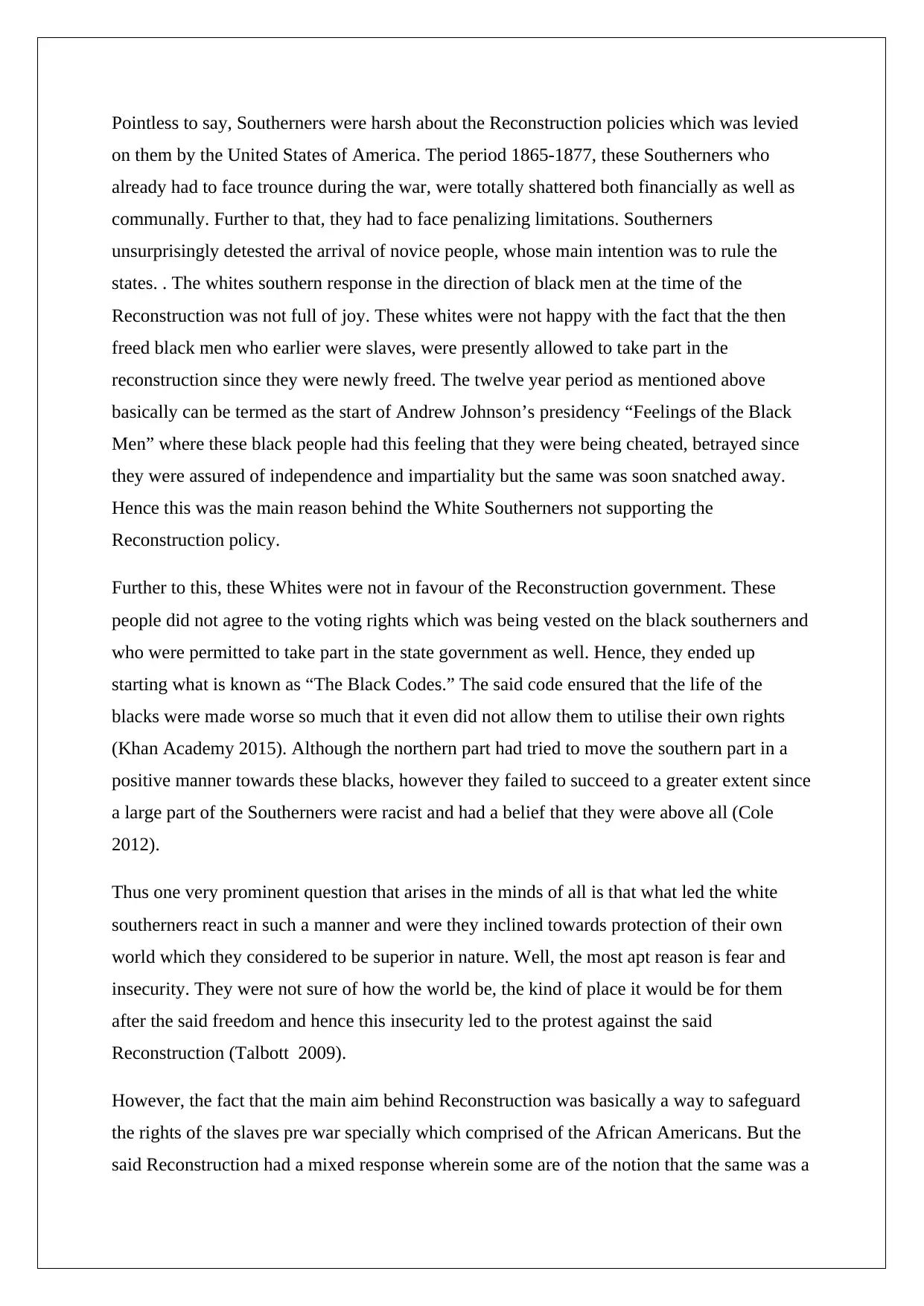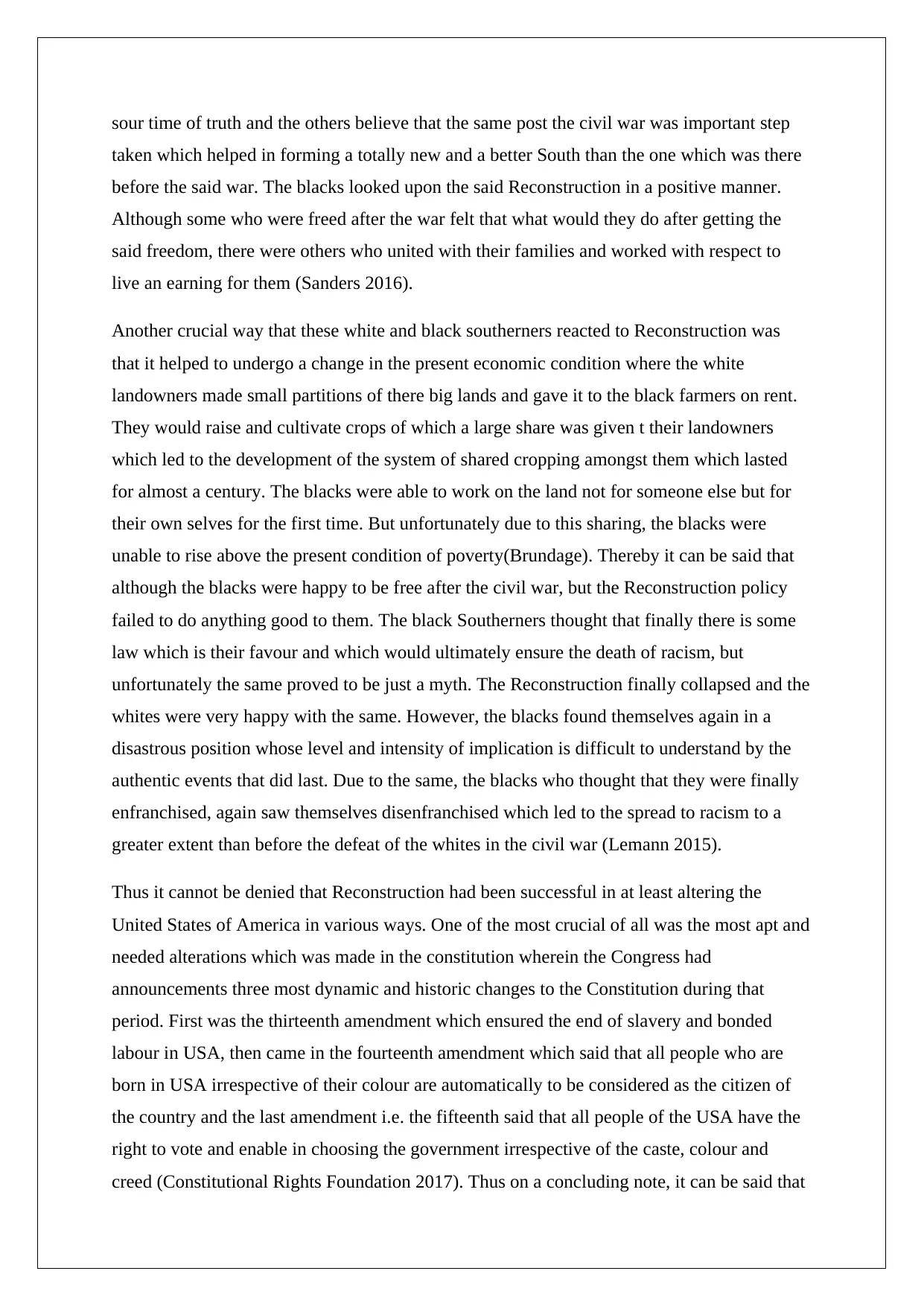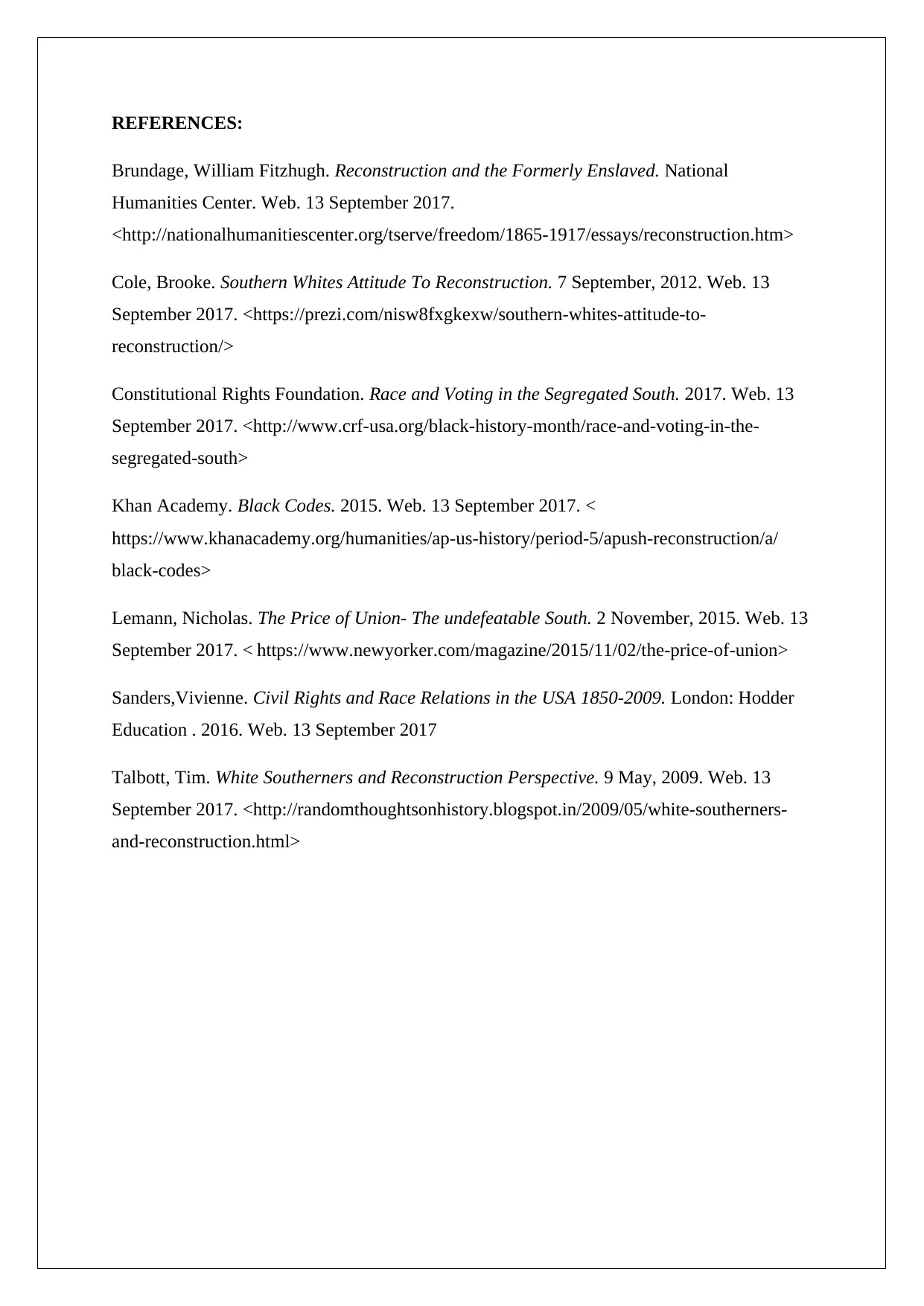HIS 101: Reactions of White and Black Southerners to Reconstruction
VerifiedAdded on 2019/10/30
|5
|1299
|234
Essay
AI Summary
This essay examines the diverse reactions of white and black southerners to the Reconstruction era (1865-1877) following the Civil War. White southerners, financially and communally shattered, resented the imposed policies and the influx of Northerners, leading to the implementation of Black Codes to restrict the rights of newly freed African Americans. This response was largely fueled by fear and insecurity about the changing social order. In contrast, the Black community initially held hopes for equality and impartiality, though these were often unmet. The essay discusses the economic changes, such as sharecropping, and the constitutional amendments (13th, 14th, and 15th) that aimed to reshape the nation. Ultimately, the essay highlights the complex and often contradictory outcomes of Reconstruction, emphasizing how it altered the United States, while also leaving many African Americans disenfranchised and subject to continued racism.

IN WHAT WAYS DID WHITE AND BLACK SOUTHERNERS
RECAT TO RECONSTRUCTION?
[Type the document subtitle]
[Pick the date]
RECAT TO RECONSTRUCTION?
[Type the document subtitle]
[Pick the date]
Paraphrase This Document
Need a fresh take? Get an instant paraphrase of this document with our AI Paraphraser

Pointless to say, Southerners were harsh about the Reconstruction policies which was levied
on them by the United States of America. The period 1865-1877, these Southerners who
already had to face trounce during the war, were totally shattered both financially as well as
communally. Further to that, they had to face penalizing limitations. Southerners
unsurprisingly detested the arrival of novice people, whose main intention was to rule the
states. . The whites southern response in the direction of black men at the time of the
Reconstruction was not full of joy. These whites were not happy with the fact that the then
freed black men who earlier were slaves, were presently allowed to take part in the
reconstruction since they were newly freed. The twelve year period as mentioned above
basically can be termed as the start of Andrew Johnson’s presidency “Feelings of the Black
Men” where these black people had this feeling that they were being cheated, betrayed since
they were assured of independence and impartiality but the same was soon snatched away.
Hence this was the main reason behind the White Southerners not supporting the
Reconstruction policy.
Further to this, these Whites were not in favour of the Reconstruction government. These
people did not agree to the voting rights which was being vested on the black southerners and
who were permitted to take part in the state government as well. Hence, they ended up
starting what is known as “The Black Codes.” The said code ensured that the life of the
blacks were made worse so much that it even did not allow them to utilise their own rights
(Khan Academy 2015). Although the northern part had tried to move the southern part in a
positive manner towards these blacks, however they failed to succeed to a greater extent since
a large part of the Southerners were racist and had a belief that they were above all (Cole
2012).
Thus one very prominent question that arises in the minds of all is that what led the white
southerners react in such a manner and were they inclined towards protection of their own
world which they considered to be superior in nature. Well, the most apt reason is fear and
insecurity. They were not sure of how the world be, the kind of place it would be for them
after the said freedom and hence this insecurity led to the protest against the said
Reconstruction (Talbott 2009).
However, the fact that the main aim behind Reconstruction was basically a way to safeguard
the rights of the slaves pre war specially which comprised of the African Americans. But the
said Reconstruction had a mixed response wherein some are of the notion that the same was a
on them by the United States of America. The period 1865-1877, these Southerners who
already had to face trounce during the war, were totally shattered both financially as well as
communally. Further to that, they had to face penalizing limitations. Southerners
unsurprisingly detested the arrival of novice people, whose main intention was to rule the
states. . The whites southern response in the direction of black men at the time of the
Reconstruction was not full of joy. These whites were not happy with the fact that the then
freed black men who earlier were slaves, were presently allowed to take part in the
reconstruction since they were newly freed. The twelve year period as mentioned above
basically can be termed as the start of Andrew Johnson’s presidency “Feelings of the Black
Men” where these black people had this feeling that they were being cheated, betrayed since
they were assured of independence and impartiality but the same was soon snatched away.
Hence this was the main reason behind the White Southerners not supporting the
Reconstruction policy.
Further to this, these Whites were not in favour of the Reconstruction government. These
people did not agree to the voting rights which was being vested on the black southerners and
who were permitted to take part in the state government as well. Hence, they ended up
starting what is known as “The Black Codes.” The said code ensured that the life of the
blacks were made worse so much that it even did not allow them to utilise their own rights
(Khan Academy 2015). Although the northern part had tried to move the southern part in a
positive manner towards these blacks, however they failed to succeed to a greater extent since
a large part of the Southerners were racist and had a belief that they were above all (Cole
2012).
Thus one very prominent question that arises in the minds of all is that what led the white
southerners react in such a manner and were they inclined towards protection of their own
world which they considered to be superior in nature. Well, the most apt reason is fear and
insecurity. They were not sure of how the world be, the kind of place it would be for them
after the said freedom and hence this insecurity led to the protest against the said
Reconstruction (Talbott 2009).
However, the fact that the main aim behind Reconstruction was basically a way to safeguard
the rights of the slaves pre war specially which comprised of the African Americans. But the
said Reconstruction had a mixed response wherein some are of the notion that the same was a

sour time of truth and the others believe that the same post the civil war was important step
taken which helped in forming a totally new and a better South than the one which was there
before the said war. The blacks looked upon the said Reconstruction in a positive manner.
Although some who were freed after the war felt that what would they do after getting the
said freedom, there were others who united with their families and worked with respect to
live an earning for them (Sanders 2016).
Another crucial way that these white and black southerners reacted to Reconstruction was
that it helped to undergo a change in the present economic condition where the white
landowners made small partitions of there big lands and gave it to the black farmers on rent.
They would raise and cultivate crops of which a large share was given t their landowners
which led to the development of the system of shared cropping amongst them which lasted
for almost a century. The blacks were able to work on the land not for someone else but for
their own selves for the first time. But unfortunately due to this sharing, the blacks were
unable to rise above the present condition of poverty(Brundage). Thereby it can be said that
although the blacks were happy to be free after the civil war, but the Reconstruction policy
failed to do anything good to them. The black Southerners thought that finally there is some
law which is their favour and which would ultimately ensure the death of racism, but
unfortunately the same proved to be just a myth. The Reconstruction finally collapsed and the
whites were very happy with the same. However, the blacks found themselves again in a
disastrous position whose level and intensity of implication is difficult to understand by the
authentic events that did last. Due to the same, the blacks who thought that they were finally
enfranchised, again saw themselves disenfranchised which led to the spread to racism to a
greater extent than before the defeat of the whites in the civil war (Lemann 2015).
Thus it cannot be denied that Reconstruction had been successful in at least altering the
United States of America in various ways. One of the most crucial of all was the most apt and
needed alterations which was made in the constitution wherein the Congress had
announcements three most dynamic and historic changes to the Constitution during that
period. First was the thirteenth amendment which ensured the end of slavery and bonded
labour in USA, then came in the fourteenth amendment which said that all people who are
born in USA irrespective of their colour are automatically to be considered as the citizen of
the country and the last amendment i.e. the fifteenth said that all people of the USA have the
right to vote and enable in choosing the government irrespective of the caste, colour and
creed (Constitutional Rights Foundation 2017). Thus on a concluding note, it can be said that
taken which helped in forming a totally new and a better South than the one which was there
before the said war. The blacks looked upon the said Reconstruction in a positive manner.
Although some who were freed after the war felt that what would they do after getting the
said freedom, there were others who united with their families and worked with respect to
live an earning for them (Sanders 2016).
Another crucial way that these white and black southerners reacted to Reconstruction was
that it helped to undergo a change in the present economic condition where the white
landowners made small partitions of there big lands and gave it to the black farmers on rent.
They would raise and cultivate crops of which a large share was given t their landowners
which led to the development of the system of shared cropping amongst them which lasted
for almost a century. The blacks were able to work on the land not for someone else but for
their own selves for the first time. But unfortunately due to this sharing, the blacks were
unable to rise above the present condition of poverty(Brundage). Thereby it can be said that
although the blacks were happy to be free after the civil war, but the Reconstruction policy
failed to do anything good to them. The black Southerners thought that finally there is some
law which is their favour and which would ultimately ensure the death of racism, but
unfortunately the same proved to be just a myth. The Reconstruction finally collapsed and the
whites were very happy with the same. However, the blacks found themselves again in a
disastrous position whose level and intensity of implication is difficult to understand by the
authentic events that did last. Due to the same, the blacks who thought that they were finally
enfranchised, again saw themselves disenfranchised which led to the spread to racism to a
greater extent than before the defeat of the whites in the civil war (Lemann 2015).
Thus it cannot be denied that Reconstruction had been successful in at least altering the
United States of America in various ways. One of the most crucial of all was the most apt and
needed alterations which was made in the constitution wherein the Congress had
announcements three most dynamic and historic changes to the Constitution during that
period. First was the thirteenth amendment which ensured the end of slavery and bonded
labour in USA, then came in the fourteenth amendment which said that all people who are
born in USA irrespective of their colour are automatically to be considered as the citizen of
the country and the last amendment i.e. the fifteenth said that all people of the USA have the
right to vote and enable in choosing the government irrespective of the caste, colour and
creed (Constitutional Rights Foundation 2017). Thus on a concluding note, it can be said that
⊘ This is a preview!⊘
Do you want full access?
Subscribe today to unlock all pages.

Trusted by 1+ million students worldwide

the Reconstruction had aroused a feeling of insecurity amongst the whites and confusion in
some freed blacks and union for some others with their families after years. The simple
reason was the kind of codes being passed against the blacks which ensured that they do not
rise above poverty even if they have been given freedom from slavery.
some freed blacks and union for some others with their families after years. The simple
reason was the kind of codes being passed against the blacks which ensured that they do not
rise above poverty even if they have been given freedom from slavery.
Paraphrase This Document
Need a fresh take? Get an instant paraphrase of this document with our AI Paraphraser

REFERENCES:
Brundage, William Fitzhugh. Reconstruction and the Formerly Enslaved. National
Humanities Center. Web. 13 September 2017.
<http://nationalhumanitiescenter.org/tserve/freedom/1865-1917/essays/reconstruction.htm>
Cole, Brooke. Southern Whites Attitude To Reconstruction. 7 September, 2012. Web. 13
September 2017. <https://prezi.com/nisw8fxgkexw/southern-whites-attitude-to-
reconstruction/>
Constitutional Rights Foundation. Race and Voting in the Segregated South. 2017. Web. 13
September 2017. <http://www.crf-usa.org/black-history-month/race-and-voting-in-the-
segregated-south>
Khan Academy. Black Codes. 2015. Web. 13 September 2017. <
https://www.khanacademy.org/humanities/ap-us-history/period-5/apush-reconstruction/a/
black-codes>
Lemann, Nicholas. The Price of Union- The undefeatable South. 2 November, 2015. Web. 13
September 2017. < https://www.newyorker.com/magazine/2015/11/02/the-price-of-union>
Sanders,Vivienne. Civil Rights and Race Relations in the USA 1850-2009. London: Hodder
Education . 2016. Web. 13 September 2017
Talbott, Tim. White Southerners and Reconstruction Perspective. 9 May, 2009. Web. 13
September 2017. <http://randomthoughtsonhistory.blogspot.in/2009/05/white-southerners-
and-reconstruction.html>
Brundage, William Fitzhugh. Reconstruction and the Formerly Enslaved. National
Humanities Center. Web. 13 September 2017.
<http://nationalhumanitiescenter.org/tserve/freedom/1865-1917/essays/reconstruction.htm>
Cole, Brooke. Southern Whites Attitude To Reconstruction. 7 September, 2012. Web. 13
September 2017. <https://prezi.com/nisw8fxgkexw/southern-whites-attitude-to-
reconstruction/>
Constitutional Rights Foundation. Race and Voting in the Segregated South. 2017. Web. 13
September 2017. <http://www.crf-usa.org/black-history-month/race-and-voting-in-the-
segregated-south>
Khan Academy. Black Codes. 2015. Web. 13 September 2017. <
https://www.khanacademy.org/humanities/ap-us-history/period-5/apush-reconstruction/a/
black-codes>
Lemann, Nicholas. The Price of Union- The undefeatable South. 2 November, 2015. Web. 13
September 2017. < https://www.newyorker.com/magazine/2015/11/02/the-price-of-union>
Sanders,Vivienne. Civil Rights and Race Relations in the USA 1850-2009. London: Hodder
Education . 2016. Web. 13 September 2017
Talbott, Tim. White Southerners and Reconstruction Perspective. 9 May, 2009. Web. 13
September 2017. <http://randomthoughtsonhistory.blogspot.in/2009/05/white-southerners-
and-reconstruction.html>
1 out of 5
Related Documents
Your All-in-One AI-Powered Toolkit for Academic Success.
+13062052269
info@desklib.com
Available 24*7 on WhatsApp / Email
![[object Object]](/_next/static/media/star-bottom.7253800d.svg)
Unlock your academic potential
Copyright © 2020–2025 A2Z Services. All Rights Reserved. Developed and managed by ZUCOL.




